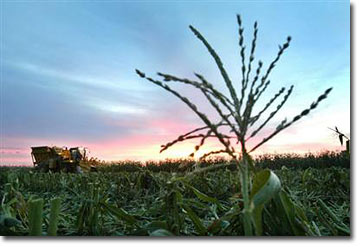Although attention commonly focuses on energy use on the farm, agriculture accounts for only one fifth of the energy used in the U.S. food system. Transport, processing, packaging, marketing, and kitchen preparation of food are responsible for the rest. The U.S. food economy uses as much energy as the entire economy of the United Kingdom.
The 14 percent of energy used in the food system to move goods from farmer to consumer is equal to two thirds of the energy used to produce the food. And an estimated 16 percent of food system energy use is devoted to canning, freezing, and drying food–everything from frozen orange juice concentrate to canned peas.
Food staples such as wheat have traditionally moved over long distances by ship, traveling from the United States to Europe, for example. What is new is the shipment of fresh fruits and vegetables over vast distances by air. Few economic activities are more energy-intensive.
SHOOT: More energy is used to move food to us than to actually grow/produce it. But the real culprit is us, once we get the ffod.
The most energy-intensive segment of the food chain is the kitchen. Much more energy is used to refrigerate and prepare food in the home than is used to produce it in the first place. The big energy user in the food system is the kitchen refrigerator, not the farm tractor. While oil dominates the production end of the food system, electricity dominates the consumption end.
The 14 percent of energy used in the food system to move goods from farmer to consumer is equal to two thirds of the energy used to produce the food. And an estimated 16 percent of food system energy use is devoted to canning, freezing, and drying food–everything from frozen orange juice concentrate to canned peas.
Food staples such as wheat have traditionally moved over long distances by ship, traveling from the United States to Europe, for example. What is new is the shipment of fresh fruits and vegetables over vast distances by air. Few economic activities are more energy-intensive.
SHOOT: More energy is used to move food to us than to actually grow/produce it. But the real culprit is us, once we get the ffod.
The most energy-intensive segment of the food chain is the kitchen. Much more energy is used to refrigerate and prepare food in the home than is used to produce it in the first place. The big energy user in the food system is the kitchen refrigerator, not the farm tractor. While oil dominates the production end of the food system, electricity dominates the consumption end.
Fertilizer accounts for 20 percent of U.S. farm energy use. Worldwide, the figure may be slightly higher. As the world urbanizes, the demand for fertilizer climbs. As people migrate from rural areas to cities, it becomes more difficult to recycle the nutrients in human waste back into the soil, requiring the use of more fertilizer. Irrigation, another major energy claimant, is requiring more energy worldwide as water tables fall. In the United States, close to 19 percent of farm energy use is for pumping water. |
 Today we are an oil-based civilization, one that is totally dependent on a resource whose production will soon be falling. Since 1981, the quantity of oil extracted has exceeded new discoveries by an ever-widening margin. In 2008, the world pumped 31 billion barrels of oil but discovered fewer than 9 billion barrels of new oil. World reserves of conventional oil are in a free fall, dropping every year.
Today we are an oil-based civilization, one that is totally dependent on a resource whose production will soon be falling. Since 1981, the quantity of oil extracted has exceeded new discoveries by an ever-widening margin. In 2008, the world pumped 31 billion barrels of oil but discovered fewer than 9 billion barrels of new oil. World reserves of conventional oil are in a free fall, dropping every year.
No comments:
Post a Comment